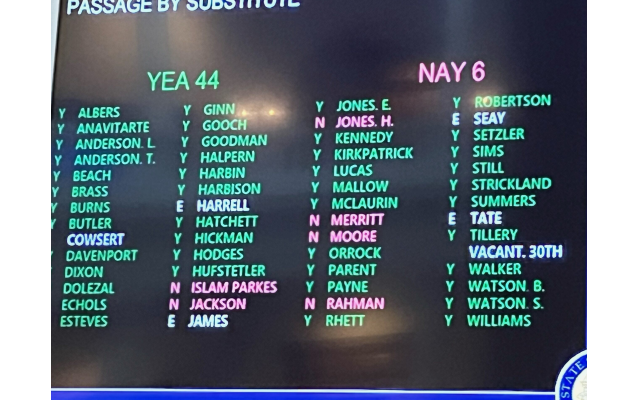Gov. Kemp Signs Antisemitism Bill
"Definitely not profiles in courage," State Rep. Esther Panitch says of House colleagues who avoided vote.
Dave Schechter is a veteran journalist whose career includes writing and producing reports from Israel and elsewhere in the Middle East.

[UPDATE] At the Jan. 31 bill-signing ceremony in the Capitol, Georgia Gov. Brian Kemp referenced the hate crimes law that became law four years ago.
“When I signed that legislation, I said that it did not right every wrong, but it was an important step,” he said. By signing the bill defining antisemitism, “We are reaffirming our commitment to a Georgia where all people can live and learn and prosper safely, because there is no place for hate in this great state.”
Kemp singled out Jewish Democratic Rep. Esther Panitch and Republican Rep. John Carson for praise, to applause from dozens of legislators gathered behind him. “Your leadership on this issue is a reminder of what we can accomplish when we work together to serve the needs of those we serve,” he said.
Kemp also credited Republican Sen. John F. Kennedy and Democratic Sen. Gloria Butler for moving the bill through the Senate, where it had stalled a year earlier.

As he signed the legislation, Kemp presented pens to Panitch, Carson, Kennedy, and Butler.
“We are thankful for the perseverance and dedication shown in getting this bill across the finish line,” Kemp said. “In Georgia we stand with our Jewish brothers and sisters, today and every day.”
Signing Day
The third time was the charm for those wanting Georgia to define antisemitism.
On Jan. 25, the Georgia Senate and then the House passed a bill that added to the state code a reference to the definition adopted by the International Holocaust Remembrance Alliance.
Because the legislation, known as House Bill 30, last year stalled in the Senate Judiciary Committee, that is where its 2024 journey began. This time, the measure unanimously cleared the committee and then the full Senate 44-6.
Back in the House, a sizable contingent of supporters from Atlanta’s Jewish community cheered from the gallery as Republican Speaker Jon Burns announced the result, 129-5.
Standing in the center aisle on the House floor, a beaming Jewish Democratic Rep. Esther Panitch hugged the bill’s chief sponsor, Republican Rep. John Carson.

After passage, Kemp said that the bill “builds on our commitment to protect Georgians from criminal acts, including those based on hate.”
The IHRA definition reads: “Antisemitism is a certain perception of Jews, which may be expressed as hatred toward Jews. Rhetorical and physical manifestations of antisemitism are directed toward Jewish or non-Jewish individuals and/or their property, toward Jewish community institutions and religious facilities.”
The IHRA definition has been controversial less for that wording than 11 accompanying examples of antisemitism, particularly several that deal with Israel — among them accusing Jews outside of Israel of dual loyalty, comparing Israel to Nazis, calling Israel “racist,” “denying the Jewish people their right to self-determination,” and applying standards to Israel “not expected or demanded of any other democratic nation.”
Efforts to pass similar legislation fell short in 2022 and 2023. Throughout three years of debate, opponents — including members of both legislative chambers and some members of the Jewish community — contended that those examples could be used to stifle speech critical of Israel.
Proponents, claiming support from major Jewish communal organizations, consistently asserted that the IHRA definition would be a tool employed by prosecutors to determine if a crime was motivated by anti-Jewish hostility and by state agencies to assess cases of discrimination.

Georgia joins 33 states that have adopted the IHRA definition via legislation, resolutions, executive orders, or proclamations. More than 40 countries (including the United States, per an executive order by then-President Donald Trump) and 1,100 non-governmental institutions also have adopted the IHRA definition.
“I hope this law never needs to be applied but am very confident it will do what it is intended to do, with some training of state prosecutors and investigators,” Panitch, who represents a north Fulton County district and co-sponsored HB 30, told the AJT.
The bill’s chief Senate sponsor, Monroe County Republican Sen. John F. Kennedy, told colleagues how an effigy of a Jew was hung from sign outside a synagogue in Macon and decried anti-Jewish flyers had been distributed in the Atlanta area and elsewhere in the state.
“This legislation is not about stifling free speech. Nor is it about the government stopping someone from simply sharing their views. It is about safeguarding the dignity and the safety of our Jewish friends and neighbors,” Kennedy said.

Before voting “no,” Gwinnett County Democratic Sen. Nikki Merritt said, “The First Amendment guarantees our rights as citizens to criticize any government, foreign and domestic. Does our Constitution not mean anything?”
Before not voting, Democrat Sen. Sally Harrell, whose district includes Dunwoody and sections of Sandy Springs, said, “If we’re going to define antisemitism in the law, then there’s a lot of other groups that experience racism, and that they should also have definitions and explanations of what racism looks like.” Harrell did not cast a vote and was listed in the roll as having been excused from voting.
Democratic Senate Minority Leader, Gloria Butler, of Stone Mountain, invoked the 1958 bombing of The Temple and Jewish support of both the civil rights movement and women’s rights. “The Jewish community stood hand-in-hand with us,” Butler said. “Today, I return their favor and stand with them.”
Those voting “yes” included Republican Sen. Ed Setzler, from Acworth, whose maneuverings effectively killed the bill in 2023. Questioned by the Atlanta Journal-Constitution, Setzler declined to explain his change.

When the bill reached the House, Carson, whose district covers northeast Cobb and southeast Cherokee counties, declared, “Folks, it’s time to get this done.”
In an exchange with Henry County Democratic Rep. El-Mahdi Holly, who voted “no,” Carson said that by passing the bill, “Georgia stands with our friends in the Jewish community.”
Holly replied, “I wish that was true of Palestinians as well.”
DeKalb County Democratic Rep. Becky Evans, another “no” vote, said that she was “concerned that the charge of antisemitism will be leveled against folks who speak out against the human rights abuses of Israel, especially students and professors on college campuses.”

Burns voiced irritation that 28 representatives did not vote, while another 18 were listed as excused, reminding members that House rules require them to vote.
“We are elected to vote on challenging issues. It is hypocritical for an elected official to ask people to vote when they won’t vote themselves. Definitely not profiles in courage,” Panitch said.
The legislation’s three-year saga began with a 2022 bill co-sponsored by Carson and then-Rep. Mike Wilensky, a Jewish Democrat.
“This is an important moment for Georgia,” said Dov Wilker, regional director of the American Jewish Committee in Atlanta. “It offers common-sense guidance to help people understand what is antisemitism, so that they are better equipped to recognize it when it happens and help fight it. It does nothing to inhibit free speech and, in fact, distinguishes between legitimate criticism of Israel and attacks that are antisemitism in disguise.”

Organizations (including Jewish Voice for Peace) joined under the name, “The Say No to HB 30 Coalition,” issued a statement that they remain opposed to HB 30 and are “gravely concerned about the bill’s manipulation of antisemitism at the expense of Georgians’ First Amendment rights by labeling criticism of Israel and Zionism as antisemitic.”
Adopting the IHRA definition would not prevent the distribution of anti-Jewish flyers, but a separate bill currently before the state Senate would enhance penalties for such activity under the state’s RICO (Racketeer Influenced and Corrupt Organizations) Act.
- News
- Local
- Dave Schechter
- antisemitism definition
- HB30
- Senate Judiciary Committee
- Republican Speaker Jon Burns
- Governor Brian Kemp
- Rep. John Carson
- Esther Panitch
- Sen. John F. Kennedy
- Sen. Nikki Merritt
- Sally Harrell
- Gloria Butler
- The Temple
- Ed Setzler
- El-Mahdi Holly
- Becky Evans
- Mike Wilensky
- Dov Wilker
- American Jewish Committee



comments